Pier Giacomo Castiglioni | |
|---|---|
 | |
| Born | 22 April 1913 Milan, Italy |
| Died | 27 November 1968 (aged 55) Milan |
| Nationality | Italian |
| Education | Politecnico di Milano |
| Known for | Architecture, design |
| Spouse | Maria Coduri de Cartosio |
| Awards | Compasso d'Oro |
| Website | piergiacomocastiglioni |
Pier Giacomo Castiglioni (22 April 1913 – 27 November 1968) was an Italian architect and designer.[1]
Early life and education


Pier Giacomo Castiglioni was born on 22 April 1913 in Milan, in Lombardy in northern Italy. He was the second son of Livia Bolla and the sculptor Giannino Castiglioni.
Castiglioni studied architecture at the Politecnico di Milano and graduated in 1937.[1] His elder brother Livio and younger brother Achille were also architects.[1]
He married Maria Coduri de Cartosio on 30 December 1942.[1]
Work and career
In 1937[1] or 1938[2] he started an architectural design practice with his brother Livio and Luigi Caccia Dominioni.[2] Amongst the designs produced by the practice were the first Italian bakelite radio for Phonola.[3][4] The studio closed in 1940.
After the Second World War he and Livio worked with their younger brother Achille, who had also graduated in architecture in 1944.[2] Much of their work was in product and exhibition design, but they also carried out a number of architectural projects,[5] including the reconstruction in 1952–53 of the Palazzo della Permanente, which had been destroyed by bombing in 1943.[1]
Livio Castiglioni left the practice in 1952[2] or 1953.[1] From then until Pier Giacomo died he and Achille worked as a team; most of their designs are not attributable to either one of them.[1][2]
Products designed by the Castiglioni brothers in the post-war years included the "Turbino",[6] "Luminator",[7] "Toio",[8] and "Arco" lamps for Flos, the "Spalter" vacuum cleaner,[9] and a number of audio devices for Brionvega.[10] Working alone, Pier Giacomo designed the "Mezzadro" stool for Zanotta based Marcel Duchamp's concept of "ready made".[11] However, it was not manufactured until 1971, three years after Castiglioni's death.[3]
In 1956 he was one of the founding members of the Associazione per il Disegno Industriale (ADI) in Milan and also taught life drawing at the Politecnico di Milano from 1964 to 1968.[1]
Castiglioni's work was awarded 5 Compasso d'Oro awards.[12]
He died in Milan on November 27,1968.[13]
Legacy
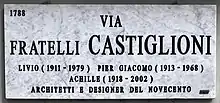
Collections holding examples of his work include those of the Museum of Modern Art (MoMA) in New York, The Pompidou Centre in Paris, the Victoria and Albert Museum (V&A) in London, and the ADI Design Museum in Milan.[14][15][16]
Reflecting on his friendship with the Castiglionis, the designer Massimo Vignelli said:
"In reality, the Castiglioni brothers were one person. Symbiosis of thought, creative ability, inspiration and execution were an integral part of their being. Talking to one of them or all three of them was the same, they were completely interchangeable, same voice, same accent, same grin, same laughter, same gestures. They were the Castiglioni, like their work, indivisible fruit of the same research, of the same passion, of a great ability to transform the world around us into a new memorable gesture."[17]
In 2014 the city of Milan named a street after the three Castiglioni brothers (Via Fratelli Castiglioni).[18]
Gallery of works
 Tabletop radio designed for Phonola (1939)
Tabletop radio designed for Phonola (1939).jpg.webp) Architectural drawing of San Gabriele Arcangelo in Mater Dei (1956–1959)
Architectural drawing of San Gabriele Arcangelo in Mater Dei (1956–1959).jpg.webp) Perspective drawing of San Gabriele Arcangelo in Mater Dei
Perspective drawing of San Gabriele Arcangelo in Mater Dei_-_BEIC_6365767.jpg.webp) Milan Triennale X, Industrial Design exposition (1954)
Milan Triennale X, Industrial Design exposition (1954) Another view of Milan Triennale X
Another view of Milan Triennale X_-_BEIC_6347052.jpg.webp) Another view of Milan Triennale X
Another view of Milan Triennale X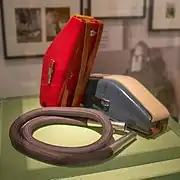 Spalter vacuum cleaner (1956)
Spalter vacuum cleaner (1956)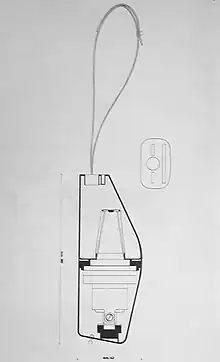 Spalter (technical drawing)
Spalter (technical drawing)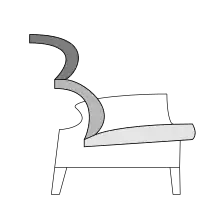 Sanluca armchair designed in 1959 for Gavina (drawing showing construction detail)
Sanluca armchair designed in 1959 for Gavina (drawing showing construction detail) RR 126 radiogram designed for Brionvega
RR 126 radiogram designed for Brionvega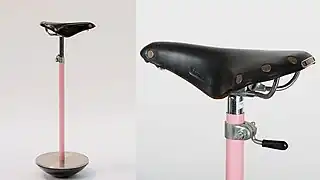 Sella stool designed for Zanotta
Sella stool designed for Zanotta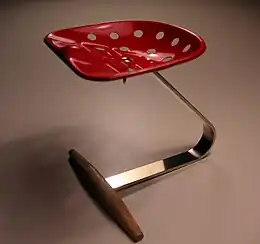 Mezzadro stool designed for Zanotta
Mezzadro stool designed for Zanotta.svg.png.webp) Drawing of Arco lamp designed for Flos (1962)
Drawing of Arco lamp designed for Flos (1962) Analog Piped Radio receiver designed for Brionvega (1967–1970)
Analog Piped Radio receiver designed for Brionvega (1967–1970)
References
- 1 2 3 4 5 6 7 8 9 Giuliana Ricci (1979). Castiglioni, Pier Giacomo (in Italian). Dizionario Biografico degli Italiani, volume 22. Roma: Istituto dell’Enciclopedia Italiana. Accessed October 2018.
- 1 2 3 4 5 William Hamilton (5 December 2002). Achille Castiglioni, 84, Italian Home Designer, Is Dead. New York Times. Accessed January 2016.
- 1 2 Gino Moliterno, Gino (2002). Encyclopedia of Contemporary Italian Culture, pp. 139–140. Routledge. ISBN 1134758774
- ↑ "Phonola – FIMI Castiglioni 547 Tipo L – radioricevitore" [Phonola – FIMI Castiglioni 547 Type L – tabletop radio]. Lombardia Beni Culturali [Lombardy Cultural Heritage]. Retrieved 17 December 2022.
- ↑ Bergamasco, Porzia (5 September 2013). "100 volte Castiglioni. Una mostra a Vicenza ricorda Pier Giacomo Castiglioni nel centenario della nascita" [100 times Castiglioni. An exhibition in Vicenza commemorates Pier Giacomo Castiglioni on the centenary of his birth]. Living (in Italian). Retrieved 2 December 2022.
- ↑ "lampada da tavolo TUBINO". FONDAZIONE ACHILLE CASTIGLIONI (in Italian). Retrieved 10 December 2022.
- ↑ "Achille Castiglioni, Pier Giacomo Castiglioni. Luminator Floor Lamp. 1955 | MoMA". The Museum of Modern Art. Retrieved 10 December 2022.
- ↑ "Achille Castiglioni, Pier Giacomo Castiglioni. Toio Floor Lamp. 1962 | MoMA". The Museum of Modern Art. Retrieved 10 December 2022.
- ↑ Museum of Modern Art. Spalter Electric Vacuum Cleaner. Castiglioni, Pier Giacomo and Achille (1956)
- ↑ "i Castiglioni". Brionvega (in Italian). Retrieved 10 December 2022.
- ↑ "Design Museum's Objects of Desire exhibition explores "what surrealism is and why it matters now"". Dezeen. 23 November 2022. Retrieved 23 November 2022.
- ↑ "Pier Giacomo Castiglioni". www.domusweb.it. Retrieved 29 July 2023.
- ↑ "CASTIGLIONI, Pier Giacomo in "Dizionario Biografico"". www.treccani.it (in Italian). Retrieved 29 July 2023.
- ↑ "Pier Giacomo Castiglioni, Italian, 1913–1968". The Museum of Modern Art. Retrieved 22 April 2023.
- ↑ "Pier Giacomo Castiglioni, Créateur de mobilier". The Centre Pompidou. Retrieved 22 April 2023.
- ↑ "Toio | Pier Giacomo Castglioni | Castiglioni, Achille | V&A Explore The Collections". Victoria and Albert Museum: Explore the Collections. Retrieved 22 April 2023.
- ↑ Vignelli, Massimo. "Massimo Vignelli – Wikiquote". it.wikiquote.org (in Italian). Retrieved 17 December 2022.
- ↑ "Via Fratelli Castiglioni in Milano". Nuove Strade [New Streets] (in Italian). 29 November 2001. Retrieved 13 November 2022.
External links
![]() Media related to Pier Giacomo Castiglioni at Wikimedia Commons
Media related to Pier Giacomo Castiglioni at Wikimedia Commons

- Studio Arch. Pier Giacomo Castiglioni
- Pier Giacomo Castiglioni, Museum of Modern Art collection
- Gigante, Rita; Monelli, Roberto. "Fondazione Achille Castiglioni, Milano (MI)". Lombardia Beni Culturali [Lombardy Cultural Heritage]. Retrieved 20 December 2022.
- "The world according to Castiglioni", Domus magazine
- "Achille e Pier Giacomo Castiglioni", RAI Television documentary, Part One (in Italian)
- "Achille e Pier Giacomo Castiglioni", RAI Television documentary, Part Two (in Italian)
- Arco Lamp assembly, short film (narration in French)